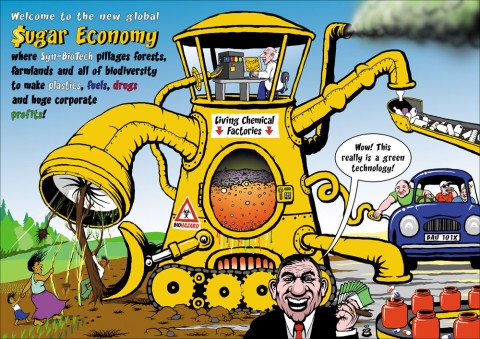Submitted by ETC Staff on

This article arises from Future Tense, a collaboration among Arizona State University, the New America Foundation, and Slate. A Future Tense conference on whether governments can keep pace with scientific advances will be held at Google D.C.'s headquarters on Feb. 3-4.
Here's a grim prediction to chew on. This biotech craze dubbed "synthetic biology"—where hipster geeks design quirky life-forms: That technology is going to wind up costing lives—likely a lot of them. I'm not suggesting a direct kill by rogue viruses. These will be economic deaths. The dead will not be noteworthy: farmers, pastoralists, and forest dwellers who live in poor nations that depend on plant commodities.
Syn bio is feted as the next big thing, but we should be clear-eyed about what makes syn bio such a big deal and about whom it will harm. Its advocates predict that synthetic bio will lead to the "New Bioeconomy," in which we harness biology to perform tasks now accomplished by manufacturing.
The New Bioeconomy seems innocently green. It involves yeast and bacteria being repurposed as bio-factories to churn out the plastics, chemicals, and fuels we are already addicted to. Since microbes feast on plant-stuff—whether algae, wood chips, or sugar—plants would replace petroleum as the key feedstock for industrial production. The sourcing of strategic raw materials, including medicines, rubber, and oils, will shift from the hands of farmers in the global South to fermentation vats controlled by the North.
The agribusiness, forestry, chemical, biotech, and energy sectors have serious money riding on this vision. Chevron and Procter & Gamble are backing LS9 Inc., whose syn bio microbes can ferment plant cellulose into gasoline, jet fuel, or plastics. * Chevron is also betting on Solazyme's sugar-munching algae to deliver a drop-in gasoline replacement, while Unilever is funding them for a palm-oil substitute. Exxon, BP, and Novartis are backing Craig Venter's Synthetic Genomics Inc. General Motors and Marathon Oil hope that Mascoma's bioengineered bugs can turn woodchips into plentiful ethanol. DuPont already brews 40,000 acres of corn a year into plastic courtesy of synthetic yeast.
Or consider syn bio darling Amyris Biotechnologies. Its researchers have rewired yeast to spit out a substance that makes diesel, gasoline, plastics, detergents, fragrances, and more. Amyris' list of partners reads like the attendance roll at Davos—Shell, Mercedes, Total Oil, Procter & Gamble, Sanofi-Aventis, Cosan, Bunge, Al Gore, Bill Gates, and Vinod Khosla. Amyris even enjoys a philanthropic sheen, having received Gates' money to produce the anti-malarial compound artemisinin in a vat in Eastern Europe instead of the fields of East Africa. When that synthetic artemisinin goes on sale next year, thousands of small-scale artemesia farmers could find their incomes pulled from under them. In time they may be joined in joblessness by rubber tappers as Goodyear scales up tire-rubber production from synthetic E. coli. Madagascar's vanilla farmers may be close behind when Evolva's vanillin-in-a-vat goes commercial.
Dispossessed farmers aren't the only downside of this new bio-industry. Fermenting all those synthetic microbes gobbles vast quantities of plants—euphemistically termed "biomass." Surprisingly, biomass is in short supply. Yes, the planet annually blooms 320 billion tons of plant stuff, but a quarter of that is already spoken for as food, feed, and firewood. The rest struggles to clean our air and water, cycle carbon, sustain biodiversity, and replenish soil fertility—ecosystem functions performed by plants long before we re-assigned them as biomass. According to the Global Footprint Network, we already overuse this biological capacity by 150 percent, running up a deepening ecosystem debt for which nature can offer no bailout. From an earth-systems perspective, taking more of the planet's biomass is akin to extracting blood from a hemorrhaging patient: stupid.
The ground-level perspective is also dismal. When Amyris starts commercial production of sugar-based diesel this year, it will drive expansion of Brazilian sugar—a water-hungry crop rapidly destroying the fragile Cerrado watershed, pushing soy production deeper into the Amazon, and releasing 150 million tons of carbon dioxide a year from harvest burning, land-use change, and fertilizer. The social costs run high, too. Expanding Brazil's agro-frontier accelerates landlessness, swelling the ranks of urban poor. Meanwhile the sugarcane itself is harvested by Brazil's army of half a million migrant workers, many of whom suffer slave conditions, respiratory health problems, and early death from exhaustion.
It's perfectly logical that syn bio companies such as Amyris are targeting Brazil for feed stocks. Eighty-six percent of global biomass is stored in the tropics or subtropics—exactly where the world's 1.5 billion peasants are also inconveniently located. Liberating biomass for a new bio-economy means first clearing away the "old bio-economy" of subsistence farming, pastoralism and hunter gathering. Even as this bio-economic transition gets under way, we are already seeing a voracious global grab on land, plant material, and natural resources.
According to the World Bank, close to 50 million hectares of tropical land have been grabbed by foreign investors in the past few years, of which 21 percent is to secure biomass for biofuel. An analysis of just 11 African countries by Friends of the Earth found an area the size of Denmark recently acquired for biofuel feedstock production. On-the-ground reports of such grabs (archived at www.farmlandgrab.org) tell of villages burnt, peasants murdered, and families going hungry.
In reporting on synthetic biology, it's the golem-like making of life-forms that grabs headlines. But in truth, syn bio's more earthly grab of land, biomass, and livelihoods matters a lot more.
Jim Thomas
Original article online at http://www.slate.com/articles/technology/future_tense/2011/02/the_sins_of_syn_bio.html
